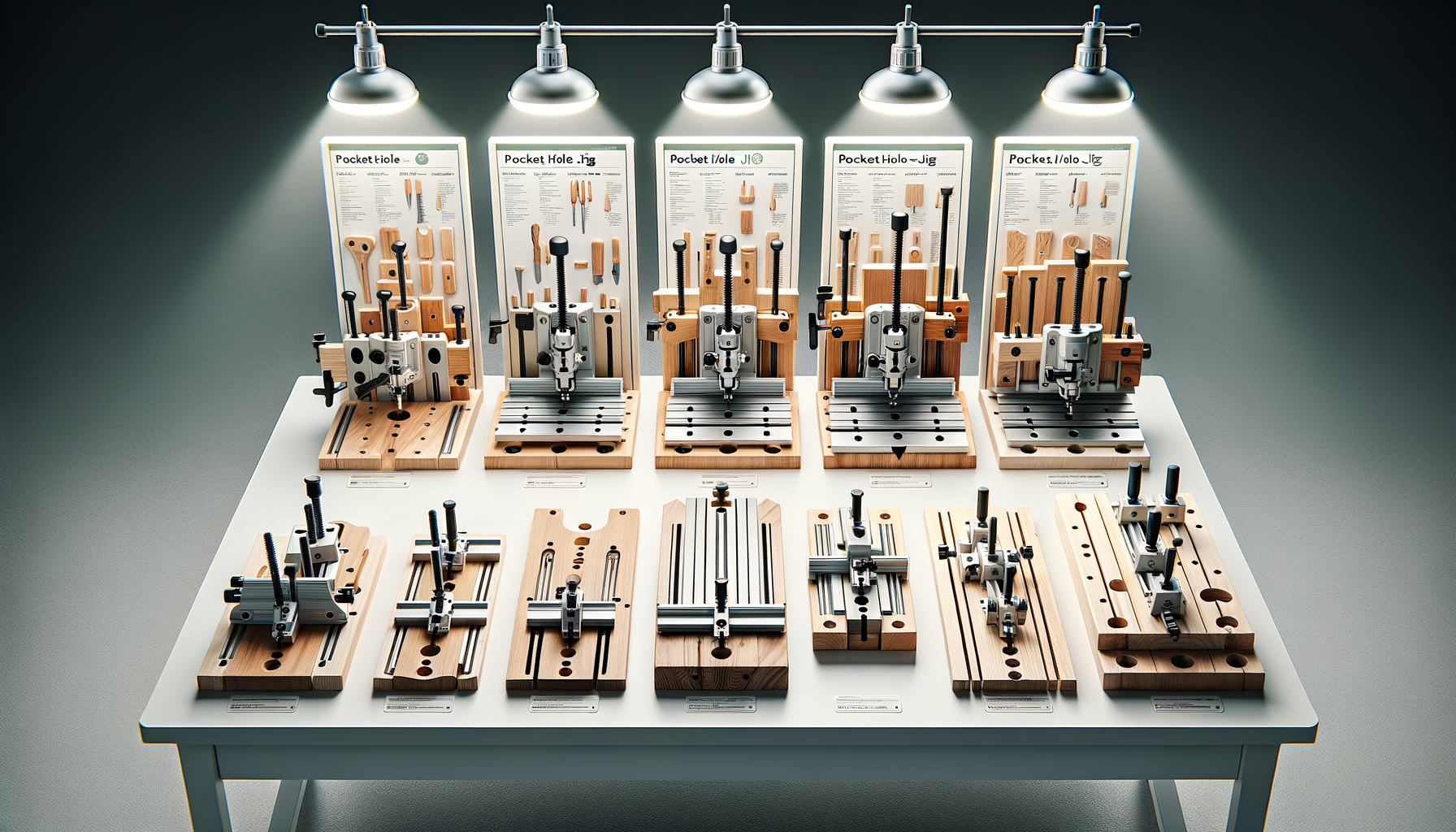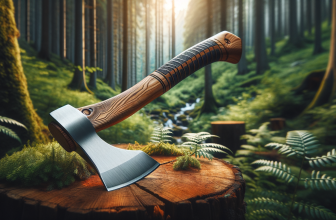
Are you starting a woodworking project and contemplating how to achieve strong, hidden joints effortlessly? A pocket hole jig might just be the woodworking accessory you’re looking for. This clever tool allows you to drill a hole at an angle into one workpiece so you can then join it to another piece with a self-tapping screw. The benefits are manifold: strong joints, no clamping, and hidden screws for a neat finish. But with various designs and brands available in the market, picking the best pocket hole jig that fits your needs could be a daunting task. So, let’s delve into the world of pocket hole jigs and discover the top picks that have been carefully tested and reviewed for their quality, reliability, and user-friendliness.
Our Top Picks
Our #1 Top Pick: Kreg Pocket Hole Jig 720PRO
The Kreg Pocket Hole Jig 720PRO stands out for its innovative features and sturdy construction. Designed for serious woodworkers, this jig offers an AutoMaxx clamp that adjusts to the thickness of your workpiece, ensuring a perfect grip every time without manual interventions. It’s outfitted with on-board storage for accessories and supports material thicknesses from 1/2 inch to 1-1/2 inches, making it incredibly versatile. The dust collection port is another standout feature, keeping your workspace clean. What makes this model particularly impressive is the included Docking Station, which adds material support wings for larger workpieces, and transforms the 720PRO into a benchtop workstation. The build quality and the thoughtfulness of design make this our top choice for a pocket hole jig.
Pick #2: Kreg K4 Pocket Hole System
For those seeking durability and simplicity, the Kreg K4 Pocket Hole System is a fantastic pick. This system is a favorite among DIY enthusiasts and professional carpenters alike because of its straightforward design and reliable function. The K4 model features a large clamping recess, making it easy to secure the jig to your workbench, and the removable drill guide can be used with a benchtop or portable base. Despite being slightly less advanced than the 720PRO, the K4 doesn’t skimp on performance and is ideal for a wide range of projects. It’s also compatible with the Kreg Micro-Pocket Drill Guide and Kreg Jig HD, which means you can upgrade your system as needed.
Pick #3: Kreg Pocket Hole Jig 320
Compact and budget-friendly, the Kreg Pocket Hole Jig 320 is an excellent entry-level option for beginners or as a secondary jig for quick and simple tasks. It features a simple and intuitive design with two drill guides and a removable spacer, allowing you to do everything from repair work to building from scratch. Its portability is a major selling point, as it can be easily transported to various job sites or used in tight spaces. Although it lacks some of the advanced features of the 720PRO, it’s a great introduction to pocket hole joinery, and the skill and flexibility it offers at this price point are commendable.
Pick #4: PORTER-CABLE 560 QUIKJIG Pocket-Hole Joinery System
The PORTER-CABLE 560 QUIKJIG is a heavy-duty jig that’s built for precision and ease of use. It features an automatic depth control system that helps to eliminate the guesswork and ensures accurate pocket depths, and it’s suitable for a vast range of material types and thicknesses. The self-adjusting clamp adjusts to your workpiece’s thickness, providing strong and consistent clamping force. This system is particularly loved for its ability to make repeatable jigs quickly, which is critical in time-sensitive projects. The durability and precision of the PORTER-CABLE 560 make it a solid investment for frequent use in demanding projects.
Pick #5: Massca Twin Pocket Hole Jig Set
Massca’s Twin Pocket Hole Jig Set is another favorite, especially among those who prefer simplicity and efficiency. It comes with two detachable magnetic drill guides which offer flexibility across a range of tasks. This set is designed for the user on a budget who still requires reliable and accurate joint creation. The hardened steel drill guides ensure that the Massca jig can withstand frequent use. The jig’s design is both user-friendly and durable, and the set includes everything you need to get started, making it a great all-in-one solution for hobbyists or intermittent users.
What to Know Before You Buy
Before making a pocket hole jig purchase, there are a few key points to consider that will help you make an informed decision:
- Material Thickness: Ensure that the jig can handle the thickness ranges of the materials you plan to work with.
- Clamping Mechanism: A reliable clamping system is crucial as it holds the workpiece steady during drilling.
- Portability: If you plan to move the jig around your shop or take it to various job sites, consider its weight and size.
- Jig Quality: Look for durable materials and well-crafted components that will withstand repeated use.
- Accessories: Some jigs come with extras such as drill bits, screws, and clamp pads which offer added value.
- Brand Reputation: Well-known brands often provide better customer service and product guarantees.
Factors to Consider Before Buying
Pocket hole jigs come in different shapes and sizes, each suited for specific tasks and preferences. Here are some important factors to weigh before making your pick:
- Type of Projects: The complexity of your projects will influence the level of jig features you’ll need.
- Frequent Use: For regular use, invest in a high-quality jig that ensures longevity and consistency.
- Adjustability: Jigs with adjustable features can accommodate a wider variety of projects and materials.
- Ease of Use: The jig should be user-friendly, especially if you’re a beginner or if you require quick alterations between tasks.
- Budget: Determine your spending limit, but remember that a higher upfront cost might mean better quality and cost savings over time.
- Safety Features: Safety is paramount, so consider jigs that come with features that protect your hands and eyes during use.
Why Trust ChooseRight?
At ChooseRight, we understand that woodworkers, whether professionals or enthusiasts, need reliable tools to produce their best work. That’s why we meticulously review products and analyze thousands of user reviews to provide comprehensive insights into the best pocket hole jigs available. Our recommendations have been validated by consulting with seasoned professionals who use these tools on a daily basis. We prioritize factual information and user experience, aiming to offer trustworthy advice that simplifies your decision-making process when selecting woodworking tools.
Finishing Thoughts
Finding the best pocket hole jig that suits your specific needs might appear challenging at first glance, given the abundance of options available. However, when equipped with sound knowledge on what to look for and the factors to consider, the choice becomes much clearer. Whether you’re a seasoned woodworker looking for an upgrade or a novice just getting started, the right jig can significantly enhance the efficiency and quality of your work. Let’s hope your journey in selecting the ideal pocket hole jig not only secures your workpieces but also brings together the important elements of your woodworking projects with precision and ease.
Frequently Asked Questions
What is a pocket hole jig used for?
A pocket hole jig is a tool that helps you drill an angled hole into one piece of wood that you can then join to another piece with a screw. It’s commonly used in woodworking for creating strong, hidden joints, especially in cabinet making and furniture construction.
How do I choose the best pocket hole jig for my needs?
Consider factors such as ease of use, adjustability, durability, and the types of projects you plan to work on. Look for jigs made from high-quality materials that offer versatility and are from reputable brands. Additionally, consider if the jig comes with accessories or if you will need to purchase them separately.
Can I use a pocket hole jig on any type of wood?
Most pocket hole jigs can be used on a variety of wood types, including softwoods, hardwoods, and plywood. However, some jigs might be better suited for specific types of wood or thicknesses, so it’s important to check the manufacturer’s recommendations.
Do I need any special screws for pocket hole joinery?
Yes, pocket hole joinery typically requires special self-tapping screws designed for the task. These screws are meant to securely join the wood pieces without splitting. They often have a flat bottom head to sit flush with the bottom of the pocket hole.
Is glue necessary when using a pocket hole jig?
While not always necessary, using wood glue in conjunction with pocket hole screws can create an even stronger joint. Glue can help to fill in any gaps and provide additional bonding strength, but it can make disassembling the joint more difficult if ever needed.
How do I prevent the wood from splitting when using a pocket hole jig?
To minimize splitting, ensure that you are using the correct drill bit and screw size for your material’s thickness, and adjust the pocket hole jig’s settings according to the manufacturer’s instructions. Also, avoid drilling too close to the end of the wood piece.
Can I create angled joints with a pocket hole jig?
Yes, pocket hole jigs are very versatile and can be used to create angled joints. By adjusting the angle of the jig or the piece being joined, you can create custom angles to suit your project.
How do I prevent the wood from moving while I’m drilling pocket holes?
Many pocket hole jigs come with clamps to securely hold the wood in place while drilling. It’s important to use these clamps or invest in separate ones to hold the workpiece steady and ensure precise hole placement.
Does the size of the pocket hole jig matter?
The size of the jig can affect its ability to handle different project sizes. Compact jigs are great for small projects and tight spaces, while larger jigs might offer more stability and features for extensive use. Consider the scale of your work when choosing a jig size.
Are there any safety concerns when using a pocket hole jig?
As with any power tool or woodworking equipment, it’s important to follow safety precautions. Always wear appropriate eye protection, follow the jig’s instructions carefully, and keep your hands clear of the drill bit during use.







